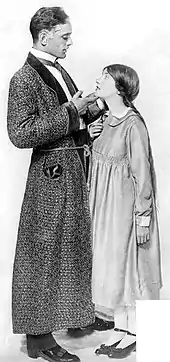Philip Merivale
Philip Merivale (2 November 1886 – 12 March 1946) was an English film and stage actor and screenwriter.
Philip Merivale | |
|---|---|
.jpg.webp) Merivale in The Stranger (1946) | |
| Born | 2 November 1886 |
| Died | 12 March 1946 (aged 59) Los Angeles, California, U.S. |
| Occupations |
|
| Years active | 1914–1946 |
| Spouses | |
| Children | 4, including John |
Life and career
Merivale was born in Rehutia, Manickpur, India, to railway engineer Walter Merivale (1855–1902) and Emma Magdalene Merivale ("Maggie"; née Pittman; 1854–1940); his father's profession meant the family lived in India, Costa Rica, and Barbados (where he was Manager of the Barbados Railway) before settling at Chiswick. Philip's sister, Dorothea, was married to the civil servant Sir Henry Bunbury, Accountant-General of the Post Office.[1][2][3]
Merivale was a respected stage actor who entered the cinema during the silent era. Merivale appeared in twenty films and also scripted one. He died from a heart ailment aged 59.
He was twice married to:
- the actress Viva Birkett (23 July 1912 – 27 June 1934); (four children: two daughters and two sons, including the actor John Merivale)[4][5][6]
- the actress Gladys Cooper (30 April 1937 – 12 March 1946).
Broadway roles


- Pygmalion (1914) – Henry Higgins
- Pollyanna (1916) – Pendleton
- Mary of Scotland (1933) – James Hepburn, 4th Earl of Bothwell
- Valley Forge (1934) – George Washington
Filmography
- Trilby (1914) – Taffy Wynne
- Whispering Shadows (1921) – Stephen Pryde
- I Loved You Wednesday (1933) – (uncredited)
- Give Us This Night (1936) – Marcello Bonelli
- All In (1936, Writer)
- Mr. & Mrs. Smith (1941) – Mr. Ashley Custer
- Rage in Heaven (1941) – Mr. Higgins
- Pacific Blackout (1941) – John Runnel
- Lady for a Night (1942) – Stephen Alderson
- This Above All (1942) – Dr. Roger Cathaway
- Crossroads (1942) – Commissaire
- Hangmen Also Die! (1943) – Policeman (uncredited)
- This Land Is Mine (1943) – Professor Sorel
- Lost Angel (1943) – Professor Peter Vincent
- The Hour Before the Dawn (1944) – Sir Leslie Buchanon
- Nothing But Trouble (1944) – Prince Saul
- Tonight and Every Night (1945) – Reverend Gerald Lundy
- Adventure (1945) – Old Ramon Estado
- The Stranger (1946) – Judge Adam Longstreet
- Sister Kenny (1946) – Dr. Brack (final film role)
References
- United States of America Congressional Record: Proceedings and Debates of the 87th Congress, First Session, vol. 107, part 9, United States Government Printing Office (Washington), 1961, p. 12008
- "Turtle Bunbury - Award-winning travel writer, historian and author based in Ireland".
- "Collection: Correspondence of the Merivale Family, mainly of Walter Merivale, railway engineer, and his wife Emma Magdalene | Bodleian Archives & Manuscripts".
- London, England, Marriages and Banns, 1754-1921
- Passenger Manifest SS Philadelphia 4 August 1906
- The Play-pictorial: Volume 20
External links
- Philip Merivale at IMDb
- Philip Merivale at the Internet Broadway Database
- Philip Merivale at Find a Grave